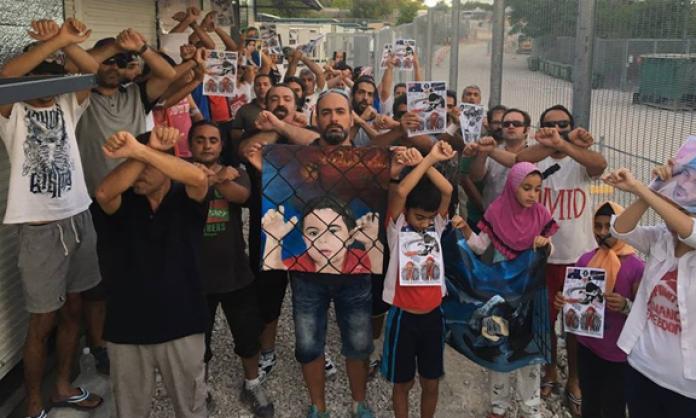For many years, Australian television crews have been denied access to the detention camp on Nauru. That’s the way the Australian government wants to keep its political prisoners: faceless and shrouded in secrecy.
Since 2014, Nauru has charged a non-refundable $8,000 visa application fee for foreign media wishing to visit the island. Unsurprisingly, none have gained access. That was the point.
We have had to rely on workers in the detention system to blow the whistle on the abusive conditions or on refugees themselves to smuggle out grainy mobile phone footage. That was until Channel Nine’s A Current Affair (ACA) and presenter Caroline Marcus were given free access to sugar-coat what are in essence torture camps.
Her message? Sure, there might be a bit of mould on the tents, but there’s nothing much to see here. Except of course some flat screen TVs and some ungrateful asylum seekers. Marcus followed up the program with a more explicit piece written in Sydney’s Daily Telegraph: “Many average Australians would have watched the story last night and wondered what all the complaining was about: on the whole, the refugees on Nauru are well-fed, most live in relative comfort and they’re free to move around as they please”.
This truly is propaganda of the absurd. It wasn’t relative comfort that drove Omid Masoumali to burn himself to death in April after three years on Nauru. Nor was it relative comfort that led six children collectively to attempt suicide using the same razor blade, or an asylum seeker to carve open his own stomach in protest at being stopped from seeing or speaking to his cousin, who was on a roof and threatening to jump.
These incidents of self-harm on Nauru are catalogued by Paul Stevenson, a trauma expert who has chosen to speak out rather than be silent. In an interview with the Guardian, published the day before ACA went to air, he said: “In my entire career of 43 years I have never seen more atrocity than I have seen in the incarcerated situations of Manus Island and Nauru”. For saying this, Stevenson’s contract was cancelled – a warning to others who might follow in his footsteps.
The ACA ode to detention comes in the context of the federal election. It was an example of corporate media doing the Liberal Party’s bidding in the most transparent of ways. That the Liberals would rely on racism was signalled by immigration minister Peter Dutton in May when he claimed that “illiterate and innumerate” migrants were intent on taking Australian jobs (while simultaneously bludging on Centrelink, of course).
As election day draws near and the polls tighten, the Liberals are desperate to change the terrain of the discussion from Medicare and their $50 billion in tax cuts for the corporate elite. But with the boats carrying asylum seekers slowed to a trickle by a combination of the militarised border and demonic levels of punishment of those in the camps, the Liberals have found it hard going to generate the necessary heat.
That’s why they have abandoned their secrecy when it comes to “on water operations”, opting instead for talking up the summary deportation of 21 Vietnamese asylum seekers intercepted by Australian navy. We should expect to hear a lot more about the existential threat posed by leaky boats in the coming week.
Shorten has fallen over himself to declare that he too has an insatiable appetite for cruelty. “I lead the party … and I said we’d stop the boats”, Shorten protested. And he’s right. Labor has a long record of punishing those seeking safety on Australian shores. And it’s not that it has merely tailed after the Liberals. At times Labor has set the pace, leapfrogging the Liberals’ anti-refugee policies and taking us to new depraved depths.
It was the Labor Party that reopened Manus and Nauru and consigned thousands to that hell indefinitely. It was Labor that crafted the PNG deal that denies them any hope of resettlement in Australia. And it was the Labor Party that introduced the “screening out” policy, a determination process in which asylum seekers are given mere minutes to establish their claims, without access to lawyers and with no right to appeal negative decisions. This is the policy utilised by Turnbull to deny the Vietnamese their rights.
It’s also the policy that allowed the previous Labor government to deport thousands of Tamil asylum seekers fleeing the genocidal violence of the Sri Lankan military. It delivered thousands back into the arms of a regime well known for its use of torture to silence and dominate the oppressed Tamil population. The pulling of fingernails is not enough to make the ALP blink.
This danger is not in the past. According to the UN special rapporteur on torture, Juan Mendez, torture by security officials in Sri Lanka remains “commonplace”. This is the probable fate that awaits the 44 Tamils currently stranded on Aceh in Indonesia if they opt once again to take to the seas in the hope of reaching Australia.
The refugee campaign can harbour no illusion that Labor will be a more humane option. Even its policy of increasing the humanitarian intake to a lousy 27,000 will take until 2025. Whoever wins the election, justice for refugees will be denied.
Demonising refugees is not some peculiar penchant of the Australian political establishment. Whether it’s US Republican presidential nominee Donald Trump’s proposed wall blocking the Mexican border, the millions spent by Britain to disrupt refugees’ attempts to cross the English Channel or the shameful deal between the European Union and Turkey forcibly to deport refugees seeking to breach Europe’s fortress, anti-immigrant politics has increasingly become the go-to tactic of governments that have little to offer but austerity.
After decades of job losses, stagnant wages and depressed living conditions in the centres of capitalism, all exacerbated by the global economic crisis, there are deep wells of discontent that can be channelled in a variety of directions. Those who have been waging this one-sided class war want it directed at the most vulnerable victims of the system, at those fleeing dictatorships backed by the West, sectarian conflict stoked by the West or broken economies privatised and pillaged by the West.
But the wave of anti-immigrant poison can be fought. Greece provides an important example. Despite 25 percent unemployment and one in six people having no access to health care, there has been widespread solidarity with refugees across the country. Eighty-five percent of Greeks agree that Greece must help refugees. The difference between Greece and much of the Western world is the level of collective resistance to austerity and anti-immigrant racism.
Resisting the poisonous divide and rule politics of the political establishment requires a fight on a number of fronts. Merely playing the polite parliamentary game won’t do. Building the fight for refugee rights means marching through city streets as well as occupying and disrupting the detention network with acts of civil disobedience.
It means standing in solidarity with those on the front lines of this barbaric system. Despite the profound demoralisation that infects the camps, refugees have shown tremendous resilience. On Nauru they have been protesting continuously. Monday 27 June marked the 100th day of protest. The demonstrations have also spread to Manus. They refuse to give up.
But the fight against racism also requires rebuilding resistance to the capitalist class. For those on the receiving end of decades of neoliberal attacks, an alternative argument has to be made about how to defend jobs and health care and win affordable housing.
It’s easier of course to kick down at those below us than it is to kick up. But that’s a false solution that only gives the powerful freedom to continue stomping on us. Collectively kicking up at the powerful offers the only hope of uniting against racism and improving all of our lives.









